Ever thought about solar panels as a long-term solution or a quick fix? They usually last 20 to 30 years. Yet, some top-quality models can go for 40 years. The Solar Energy Industries Association (SEIA) backs this up. They say solar tech is really dependable for many years. Even after they reach the end of their usual life, they still work.
This long life changes how we see clean energy. Using solar power means less need for things like oil. Plus, it helps the environment. Panels that last for so long keep being useful. They’re a smart pick for anyone looking ahead.
Key Takeaways
- Solar panels generally last between 20 to 30 years, with some lasting up to 40 years.
- The gradual decline in efficiency, known as the degradation rate, affects long-term performance.
- Industry experts like SEIA affirm the longevity and reliability of solar panels.
- Investing in solar panels offers both environmental and economic benefits.
- Durable solar panels contribute to reducing reliance on fossil fuels.
Introduction to Solar Panel Lifespan
Thinking about using solar energy? It’s key to know how long solar panels work. Usually, they last between 20 and 30 years. Yet, some high-quality types can keep going even longer.
The National Renewable Energy Laboratory (NREL) says solar panels are sturdy. They slowly work less well over time. But, this doesn’t affect their overall performance much.
Solar panels help make homes more independent with power. They give a reliable, green energy source. Knowing their lifespan can help make smart energy choices for the future.
Here’s a quick look at different solar panel lifespans:
| Type of Solar Panel | Average Lifespan (Years) | Degradation Rate |
|---|---|---|
| Standard Panels | 20-25 | 0.5% per year |
| High-Quality Panels | 25-30 | 0.3% per year |
| Premium Panels | 30-40 | 0.2% per year |
Learning about solar panel lifespans helps with your investment. It shows the impact of choosing sustainable energy. With reliable, green power, solar panels offer a bright future for everyone.
The Standard Lifespan of Solar Panels
Solar panels are key in home solar energy systems and last around 25 to 30 years. Their strong build and high-quality materials help them last so long. Reputable brands often guarantee their efficiency for 25 years or more.

The solar industry’s focus on quality increases trust in solar panels. Solar panels are carefully tested to make sure they work well and last long. This makes them meet, or sometimes even beat, customer expectations.
Buying solar panels is a good long-term choice that saves on energy bills for homeowners. With a solid warranty and a long life expectancy, they’re a reliable way to lower electricity costs. They’re also great for the environment by reducing your carbon footprint.
Thanks to new technology, solar panels are getting more efficient. The success of past installations shows that they’re a smart choice for the future. This means solar panels are still a wise investment for your home’s energy needs.
Factors Affecting Solar Panel Longevity
To understand how long solar panels last, we must look at some key points. These factors are important for the lifetime of your panels.
Quality of Solar Panels
The quality of solar panels matters a lot. Panels made by top brands with the latest tech last longer. They are more durable and efficient. So, picking quality panels is a smart move. They fight off wear and tear for a longer time.
Weather Conditions
The weather can impact how long your solar panels last. Big swings in temperature or rough storms can wear them down. While good panels may handle this better, extreme weather can still harm them.
Installation and Maintenance
Installing solar panels right is key. They should be installed well and checked often to prevent damage. Keeping them clean and fixing any problems early on makes them last longer. Good setup and care can add years to your solar panels.
Solar Panel Degradation Rate
It’s vital to know how solar panels degrade over time. The solar panel degradation rate shows the yearly fall in a panel’s power and efficiency. Info from the NREL says this is usually 0.5% each year.
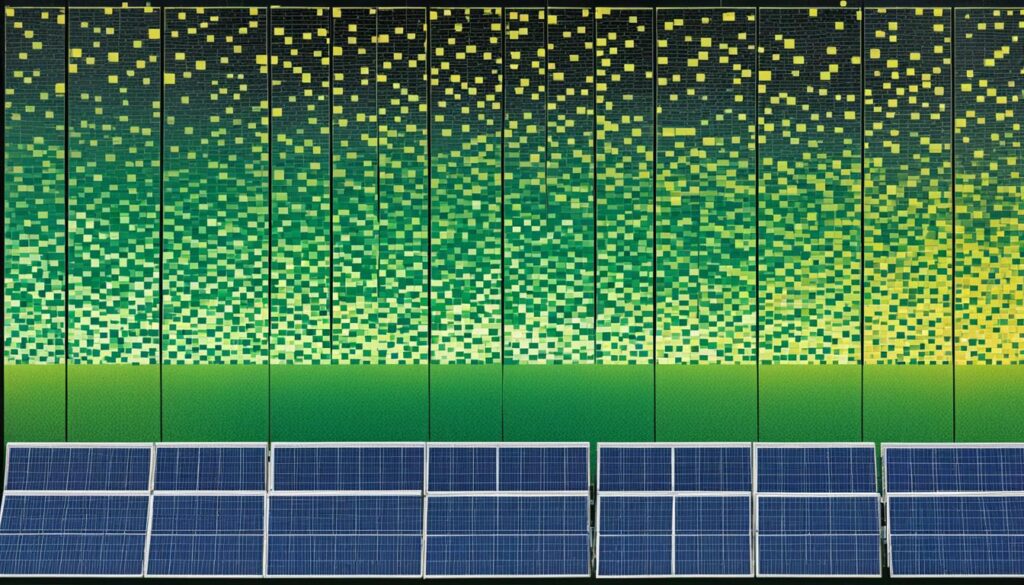
Understanding Degradation Rate
This rate measures how solar panels work less well as time goes on. They start to convert sunlight into power less efficiently each year. This drop is normal and you must consider it for long-term energy planning.
Average Degradation Rates
Most solar panels lose about 0.5% of efficiency every year. This number can change due to different factors. Quality panels usually maintain their efficiency better than low-quality ones. Here’s a table to compare the fall in efficiency for different solar panels:
| Panel Type | Average Degradation Rate |
|---|---|
| Monocrystalline | 0.3% – 0.5% per year |
| Polycrystalline | 0.5% – 0.7% per year |
| Thin-Film | 0.7% – 1.0% per year |
Impact on Energy Production
As solar panels become less efficient, the energy they produce goes down. Over 25-30 years, a panel can lose 10 – 20% of its efficiency. So, while they’ll still make power, it will go down a bit each year. This info is key for those forecasting energy savings and returns on solar investments.
High-Quality vs. Low-Quality Solar Panels
Knowing the difference between high and low-quality solar panels is important. It impacts both the initial cost and how well your solar system works over time.
Tier One solar panels are made with the best materials and modern tech. They last longer, keeping their efficiency better than lower quality ones. Big companies like SunPower, LG, and Panasonic back their panels with strong warranties. Choosing cheaper, low-quality panels might save you money upfront. But, they lose efficiency faster and need more repairs, costing you more in the end.
Let’s compare the quality of solar panels to help you make a smart choice:
| Tier One Solar Panels | Low-Quality Solar Panels |
|---|---|
| Superior materials and advanced technology | Basic materials and outdated technology |
| Lower degradation rates | Higher degradation rates |
| High efficiency and output over time | Lower efficiency and output over time |
| Comprehensive warranties (up to 25 years) | Limited warranties (10-15 years) |
| Better long-term solar panel investment return | Poor long-term investment return |
| Backed by reputable manufacturers | Often produced by lesser-known companies |
Choosing Tier One panels means more efficiency, longer life, and a better investment return. Going for low-quality might be cheaper at first. But, it could end up costing you more and giving you less in the long term.
The Importance of Proper Installation
Getting your solar panels installed right is key. If not done properly, they might not last long or work well. This can lower the benefits you get from having solar panels at home. So, always choose well-trained professionals to install your solar panels. This will help make sure they’re put in place correctly.
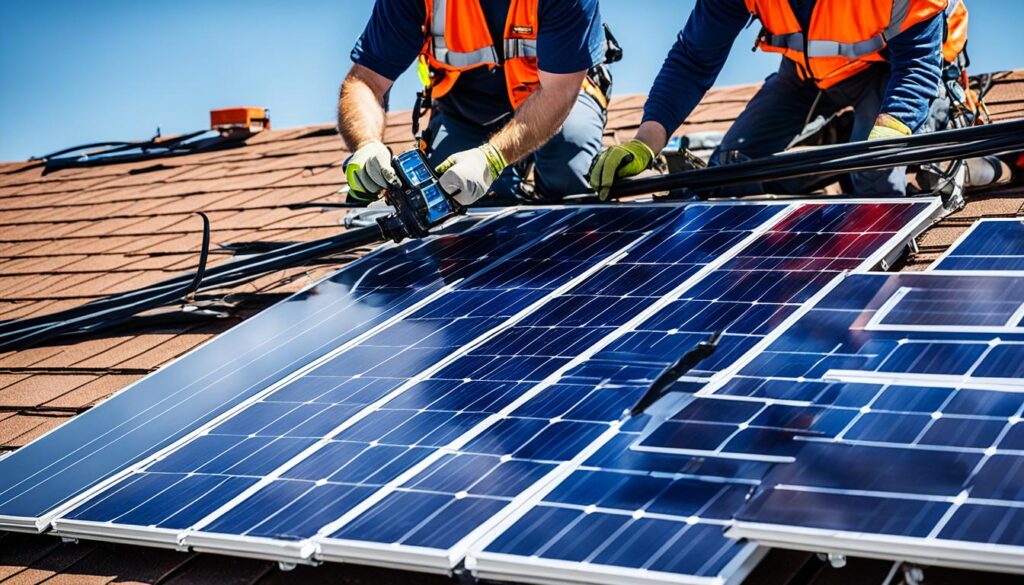
Choosing a Reputable Installer
Picking the right team to install your panels matters a lot. Make sure the installers you choose have a good history and the right certifications. It’s wise to see if they have the NABCEP seal of approval. Working with such installers will ensure your solar panels do their job right from the start.
Installation Techniques
The way your panels are put up is crucial, too. They should follow strict guidelines to avoid problems later. This includes using high-quality mounts. This helps your panels last longer and work efficiently despite the weather it faces.
It’s all about solar panel installation quality and selecting solar installation professionals who know their stuff. This can really up the game for your solar power system.
| Criteria | Benefits |
|---|---|
| Reputable Installer | Ensures proper mounting, electrical safety, and overall system performance |
| Advanced Techniques | Prevents future issues, ensures durability, and maximizes efficiency |
| Quality Equipment | Offers greater stability and resilience to environmental factors |
How Long Does a Solar Panel Last?
Solar panels usually last between 25 to 30 years. Over time, their efficiency decreases. This decline means you might need to replace them, but not always.
If you use good quality panels and have them set up by pros, they could last longer. This makes your investment more valuable and supports sustainability.
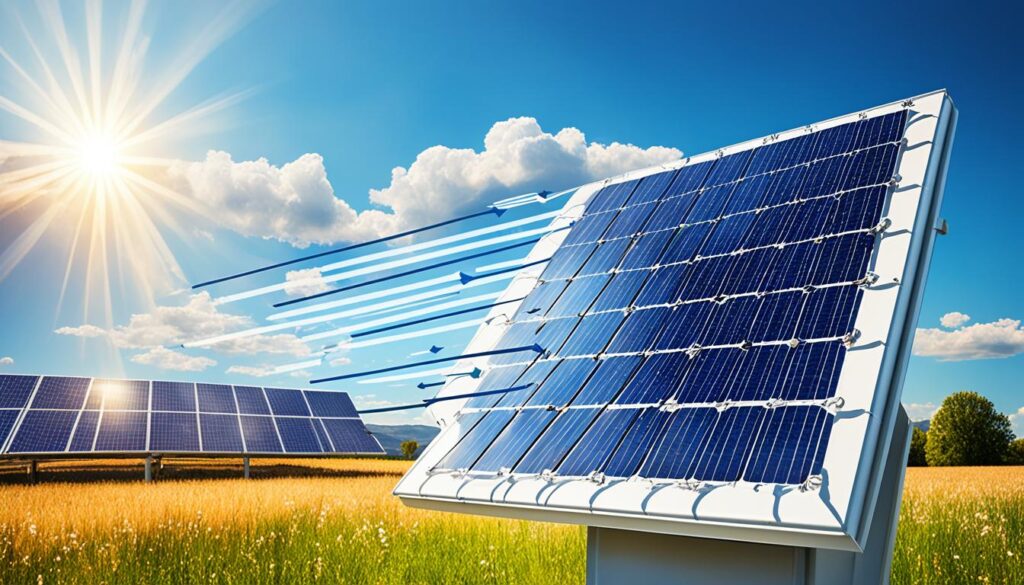
Where you put the panels and how well you take care of them matters. Keeping an eye on their environment and regular maintenance can make them last longer.
Knowing how long solar panels last and how they lose efficiency helps you plan. You can save money and keep benefiting the environment if you plan ahead for when they might need replacing.
Warranty and Solar Panel Lifespan
Thinking about going solar? It’s important to know about solar panel warranties. There are two main kinds: performance and equipment warranties. Performance warranties guarantee how much energy the panels will make for up to 25 years. Even as the panels get older, these warranties promise a certain level of power.
Equipment warranties cover the actual materials and how they were made. They can last from 10 to 25 years. Homeowners get assurance that their solar investment is sturdy and reliable. So, these warranties protect against any manufacturing issues, showing that good brands stand by their products.
Knowing about these warranty types boosts your confidence in the solar panels’ lifespan. Performance warranties show the manufacturer believes in the panel’s long-term performance. This insight is key for those thinking about buying solar panels. It gives them a clear picture of what to expect from their solar system now and in the future.

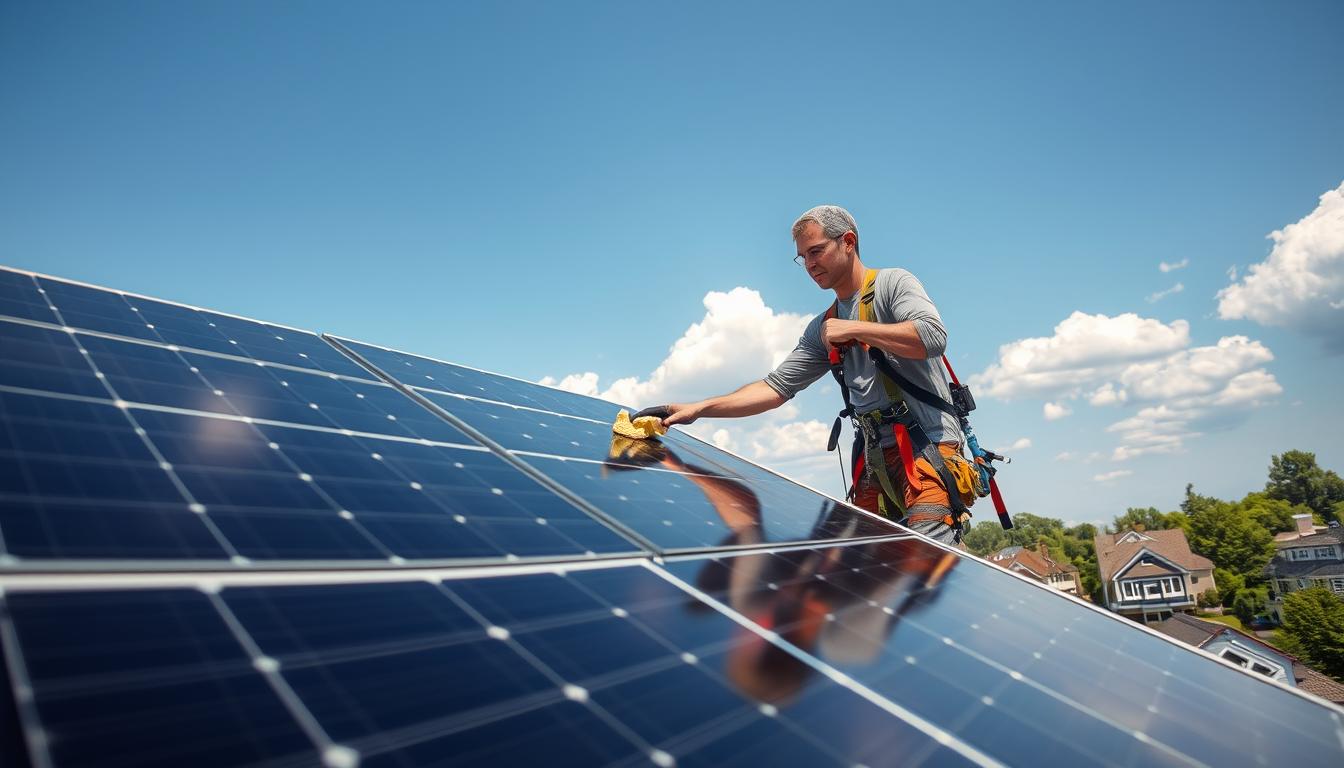
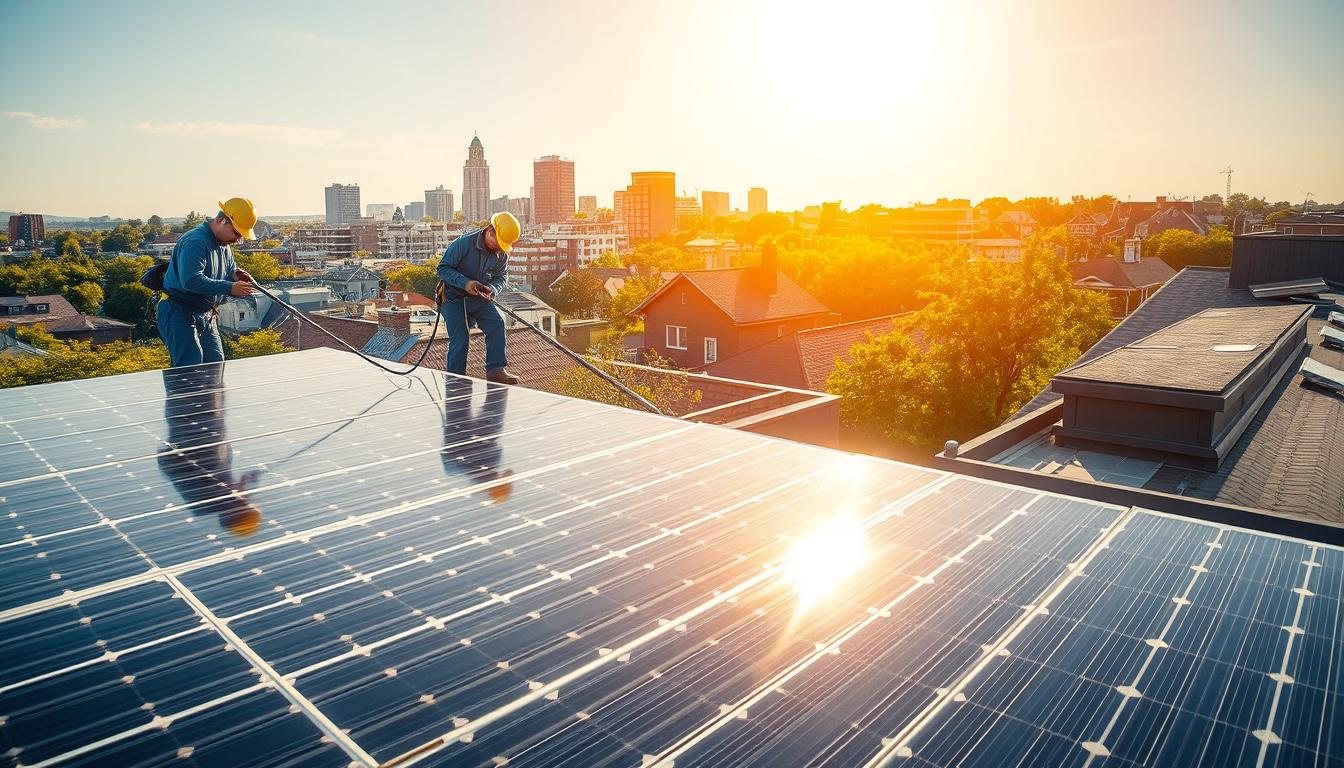

Interesting read, but Ive got a mate whos had solar panels for 20 years and theyre still going strong. So, are we sure this standard lifespan isnt just marketing hype to sell more panels? I mean, if they can last way longer, wouldnt that be better for the environment? Just thinking out loud here.
Interesting read, but arent we overlooking the elephant in the room here? What about the environmental impact of manufacturing and disposing of these solar panels? 25-30 years of life sounds great, but isnt the green footprint tarnished by their production and end-of-life? Just some food for thought, folks!
Im curious – do you think advancements in technology will significantly increase the lifespan of solar panels in the future? Or are we already close to reaching the maximum potential? Lets discuss!
I found it surprising that the article didnt mention the impact of extreme weather conditions on solar panel lifespan. It seems like a crucial factor to consider, dont you think?
Extreme weather can definitely affect solar panel lifespan. Its a major oversight not to mention it.
I believe that advancements in solar panel technology will continue to extend their lifespan. Who knows, maybe in the future well have panels that last a lifetime! Exciting stuff!
Interesting read, but arent we glossing over the environmental impact of producing and disposing of these solar panels? Just food for thought.
Interesting read, but dont you think we are underestimating the tech advances? I bet well have super-efficient panels in 5 years. Just saying.
Tech advances are unpredictable. Lets not count our panels before theyre efficient.
Isnt it rather reductive to quote a standard lifespan for solar panels without discussing quality variations between brands?
Interesting read, but isnt it crucial to also factor in the impact of climate change on solar panel longevity?
Interesting read. But isnt the lifespan of solar panels also dependent on the geographical location/climate of installation? Just a thought.
Interesting read, but does the panels efficiency decline steadily or does it plummet after a certain period?
Interesting read. But, arent we overlooking the impact of harsh weather conditions on solar panel lifespan?